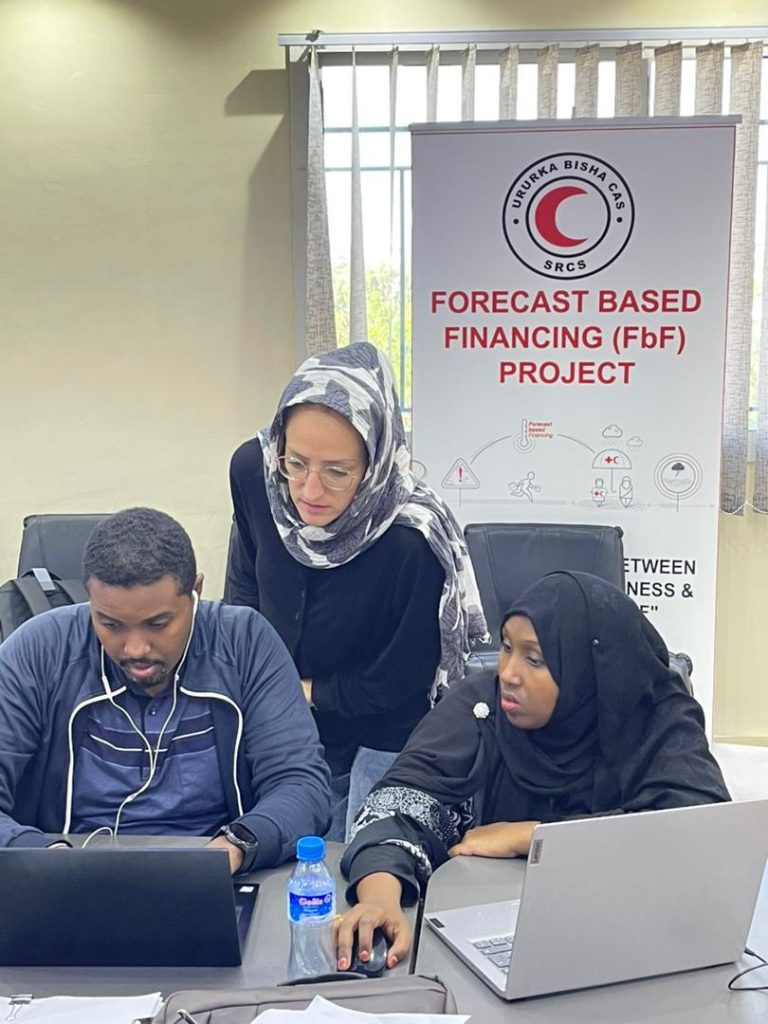Since 2022, HeiGIT is providing technical support to the Somali Red Crescent Society (SRCS) in Somalia. The objective was the development of an Early Action Protocol (EAP) for droughts in Somalia, a plan developed by RCRC National Societies that outlines early actions to be taken when a specific hazard is forecasted to impact communities. In this context and within the frame of a long-standing collaboration, HeiGIT is working with the German Red Cross (GRC) who support the SRCS in setting up the EAP. During the last two years, a risk assessment and historical impact assessment of previous drought periods were successfully conducted as a basis to develop a trigger mechanism which defines when an EAP would be activated. The Red Cross Red Crescent Climate Center (RCRCCC) also cooperated in the development of the trigger mechanism. With this, all steps to submit the EAP for final approval and to receive funding have been finalized.
Triggers are a core component of anticipatory action plans, since they form the base of the decision when to act. In order to automatically release funds for early actions before an upcoming drought, clear guidelines on where and when funds will be allocated need to be established. In the case of the Somalia drought EAP, this decision is based on a Standardized Precipitation Index forecast running for 12 months (SPI-12) as well as food insecurity projections (obtained from Famine Early Warning Systems Network) combined with risk data. Further actions are triggered when certain predefined thresholds are met. The whole workflow and process was developed by HeiGIT gGmbH in collaboration with the SRCS, German Red Cross (GRC) and the Red Cross Red Crescent Climate Centre (RCCC). The partnership is guided by the principles of open source and seamless knowledge transfer.

In order to ensure the sustainable use of the developed trigger workflow, Anne Schauss and Alec Schulze-Eckel from HeiGIT travelled to Somaliland and handed over the work and knowledge to the local SRCS team, who will ultimately own it.
The workshop “Geodata Analysis for Forecast Based Financing Trigger Mechanism” took place from 4th – 7th of December 2023 in the SRCS Coordination Office in Hargeisa, Somaliland.
Thirteen participants from Hargeisa coordination office attended the workshop which was divided into theoretical and practical parts. The workshop focused on the trigger mechanism, but the setup ensured that participants also learned how to apply and work with geodata using examples from their own work. After an introduction to geodata and QGIS, the second and third days were all about understanding and executing the trigger workflow, while the last day was used to apply the gained knowledge on existing local projects.
Since most participants had already participated in the first HeiGIT training on October 2022, the training was effective and the pace of learning and consolidation was quick. It was well received by the participants, making them familiar with the workflow of the developed trigger mechanism and enabling them to independently conduct trigger verification on a monthly basis independently. This implies downloading the current forecasting data, inputting it into the automated workflow and visualizing the results for reporting.

Beyond this, the training fostered a holistic understanding on the importance of geodata in the work of SRCS and on how it can be useful for individual application cases, such as the mapping of berkads, visualizing healthcare accessibility and improving reporting to donors in general. We thank the SRCS staff for their great participation, interest and motivation, and are looking forward to continuing a good cooperation!
Want to learn more about interesting news and events related to the application of geospatial information in the fields of mobility, humanitarian aid and data analytics? Follow our social media channels and stay up to date on upcoming mapping, conferences and geospatial content with our blog!

